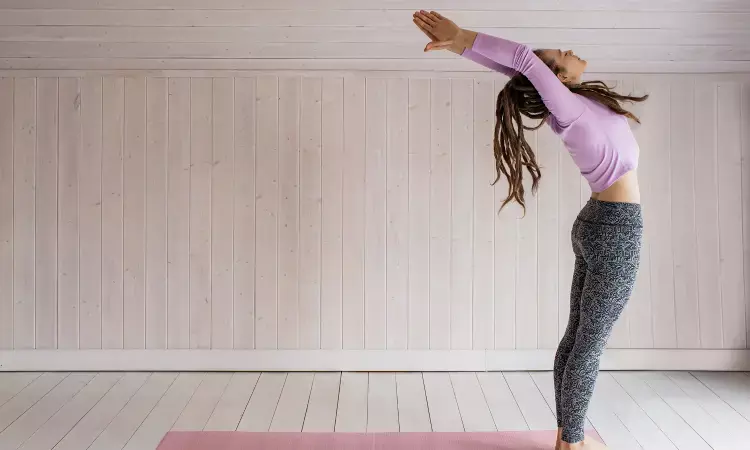- Home
- Medical news & Guidelines
- Anesthesiology
- Cardiology and CTVS
- Critical Care
- Dentistry
- Dermatology
- Diabetes and Endocrinology
- ENT
- Gastroenterology
- Medicine
- Nephrology
- Neurology
- Obstretics-Gynaecology
- Oncology
- Ophthalmology
- Orthopaedics
- Pediatrics-Neonatology
- Psychiatry
- Pulmonology
- Radiology
- Surgery
- Urology
- Laboratory Medicine
- Diet
- Nursing
- Paramedical
- Physiotherapy
- Health news
- Fact Check
- Bone Health Fact Check
- Brain Health Fact Check
- Cancer Related Fact Check
- Child Care Fact Check
- Dental and oral health fact check
- Diabetes and metabolic health fact check
- Diet and Nutrition Fact Check
- Eye and ENT Care Fact Check
- Fitness fact check
- Gut health fact check
- Heart health fact check
- Kidney health fact check
- Medical education fact check
- Men's health fact check
- Respiratory fact check
- Skin and hair care fact check
- Vaccine and Immunization fact check
- Women's health fact check
- AYUSH
- State News
- Andaman and Nicobar Islands
- Andhra Pradesh
- Arunachal Pradesh
- Assam
- Bihar
- Chandigarh
- Chattisgarh
- Dadra and Nagar Haveli
- Daman and Diu
- Delhi
- Goa
- Gujarat
- Haryana
- Himachal Pradesh
- Jammu & Kashmir
- Jharkhand
- Karnataka
- Kerala
- Ladakh
- Lakshadweep
- Madhya Pradesh
- Maharashtra
- Manipur
- Meghalaya
- Mizoram
- Nagaland
- Odisha
- Puducherry
- Punjab
- Rajasthan
- Sikkim
- Tamil Nadu
- Telangana
- Tripura
- Uttar Pradesh
- Uttrakhand
- West Bengal
- Medical Education
- Industry
Home-Based Program Enhances Exercise Capacity and Quality of Life After Lung Cancer Surgery: JAMA

Researchers have established that a home-based exercise and self-management program considerably enhances exercise capacity, quality of life, and exercise efficiency in patients recovering from lung cancer surgery. A recent study was conducted by Catherine L. and colleagues which was published in the journal JAMA Network Open.
This study was an assessment of the physical function and exercise capacity through improving quality of life in lung cancer surgery rehabilitation through a physiotherapist-led consultation during a home-based exercise and self-management program in patients.
The trial enrolled 116 patients undergoing surgery for non–small cell lung cancer between November 2017 and July 2023 at tertiary hospitals in Australia. Participants (mean age 66.4 years; 58.6% women) were randomized into two groups:
• Intervention group (58 patients): Received a 3-month home-based exercise and self-management program, supported by weekly physiotherapist-led telephone consultations.
• Control group (58 patients): Received standard postoperative care.
The primary outcome was self-reported physical functioning measured using the European Organization for the Research and Treatment of Cancer Core Quality of Life Questionnaire (EORTC QLQ-C30) at 3 months. Secondary outcomes included objective measures of physical function, exercise capacity (6-minute walk distance), and patient-reported quality of life. Follow-up assessments were conducted at 3, 6, and 12 months.
Key Findings
Primary Outcome:
• At 3 months, no clinically significant differences existed in self-reported physical functioning between the intervention and control groups (mean score: 77.3 vs. 76.3; mean difference, 1.0 point [95% CI, −6.0 to 8.0]).
Secondary Outcomes at 3 Months:
• Exercise capacity: Intervention group had a greater 6-minute walk distance (mean difference, 39.7 m [95% CI, 6.8-72.6 m]).
• Global quality of life: Scores higher in the intervention group (mean difference, 7.1 points [95% CI, 0.4-13.8 points]).
• Exercise self-efficacy: Improved significantly in the intervention group (mean difference, 16.0 points [95% CI, 7.0-24.9 points]).
Secondary Outcomes at 6 Months:
• Physical function: The scores of the Short Physical Performance Battery were higher in the intervention group (mean difference, 0.8 points [95% CI, 0.1-1.6 points]).
• Exercise capacity: Significant increase in 6-minute walk distance (mean difference, 50.9 m [95% CI, 6.7-95.1 m]).
• Exercise self-efficacy: The intervention group maintained its advantage (mean difference, 10.1 points [95% CI, 1.9-18.2 points]).
• There was one minor adverse event and no serious adverse events, thus demonstrating the safety of the program.
Patients following postoperative lung cancer surgery received benefit from an at-home, aftercare-based, exercise and self-management program based on an earlier randomized controlled exercise in trials. Improving exercise capacity as well as physical functions and quality of life, no potential benefit to these patients from increased self-reported improvement in physical functioning was reported based on a related randomized trial exercise.
Reference:
Granger CL, Edbrooke L, Antippa P, et al. Home-Based Exercise and Self-Management After Lung Cancer Resection: A Randomized Clinical Trial. JAMA Netw Open. 2024;7(12):e2447325. doi:10.1001/jamanetworkopen.2024.47325
Dr Riya Dave has completed dentistry from Gujarat University in 2022. She is a dentist and accomplished medical and scientific writer known for her commitment to bridging the gap between clinical expertise and accessible healthcare information. She has been actively involved in writing blogs related to health and wellness.
Dr Kamal Kant Kohli-MBBS, DTCD- a chest specialist with more than 30 years of practice and a flair for writing clinical articles, Dr Kamal Kant Kohli joined Medical Dialogues as a Chief Editor of Medical News. Besides writing articles, as an editor, he proofreads and verifies all the medical content published on Medical Dialogues including those coming from journals, studies,medical conferences,guidelines etc. Email: drkohli@medicaldialogues.in. Contact no. 011-43720751


